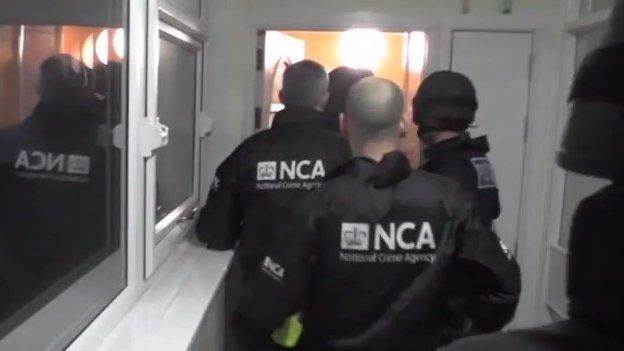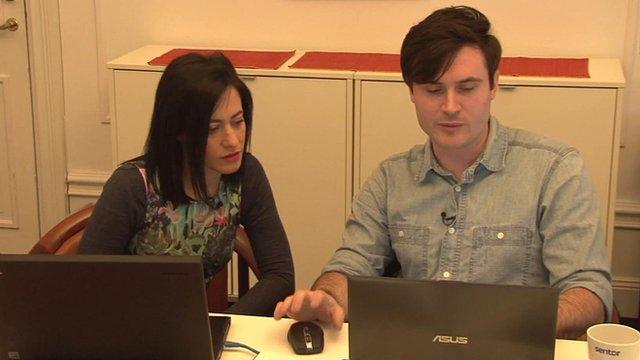Computer hijacking arrests in UK and across Europe
- Published

Officers from the National Crime Agency carried out the raids on suspected computer hijackers
Fifteen people have been arrested, including four in the UK, in connection with the hijacking of computers.
Police say the individuals were using software designed to remotely control computers - allowing for the stealing of information.
The other arrests were made in Estonia, France, Romania, Latvia, Italy, and Norway.
The practice, which in some instances can grant access to a victim's webcam, is known as "Ratting".
The phrase takes its name from the malicious software used to gain control - Remote Access Trojans (Rats).
Using Rats to view people through their own webcams, without their knowledge, is becoming "increasingly common" according to the UK government-backed Get Safe Online advice website.
The National Crime Agency (NCA) said it arrested two 33-year-old men, and a 30-year-old woman, in Leeds.
Rachel Hyndman tells 5 live she was 'horrified' by the incident
A 20-year-old man was arrested in Chatham, Kent, while a 19-year-old man had his home searched in Liverpool and was brought in for "voluntary questioning".
They are all accused of knowingly using Rats to spy on multiple targets.
"Victims are typically infected by being convinced to click on a link purporting to be a picture or video, or disguised as a legitimate file, but is instead an installer for the Rat," the NCA explained in a statement.
"In many cases, those who unwittingly install such trojans will have no indication that their machine is infected."

How to protect your webcam

Webcams are a great way to keep in touch - with precaution
Webcams can be affected by viruses so be wary of emails and social network messages from strangers
Make sure anti-virus and firewall protection is kept up to date
Avoid putting webcams in bedrooms or other private areas
Unplug the webcam, cover the lens or point it at a blank wall when it is not in use
Be sure you can trust the person you are chatting to and remember webcam footage can be recorded and potentially shared online
If you have been the victim of inappropriate sexual contact via webcam tell a trusted adult and report it to the police via the Child Exploitation and Online Protection centre (Ceop)
Source: ChildNet International and Ceop

As well as the arrests, the NCA said it was warning other users that the software was illegal, and its use would result in further action.
"The illegal use of Remote Access Trojans is a significant cybercrime threat, demanding this kind of strong, co-ordinated response from international to local UK level," said Andy Archibald, deputy director of the NCA's National Cyber Crime Unit.
"Suspected users of Rats are continuing to find that, despite having no physical contact or interaction with their victims, they can still be identified, tracked down and arrested by the NCA and its partners."
An investigation by BBC Radio 5 live in June last year looked into the growing problem of Ratting.
One victim, student Rachel Hyndman, told the station: "I was sitting in the bath, trying to relax, and suddenly someone potentially has access to me in this incredibly private moment and it's horrifying.
"To have it happen to you without your consent is horribly violating."
The investigation uncovered websites where hackers share pictures and videos of their victims.
Follow Dave Lee on Twitter @DaveLeeBBC, external
- Published20 June 2013

- Published3 June 2013

- Published21 May 2012
